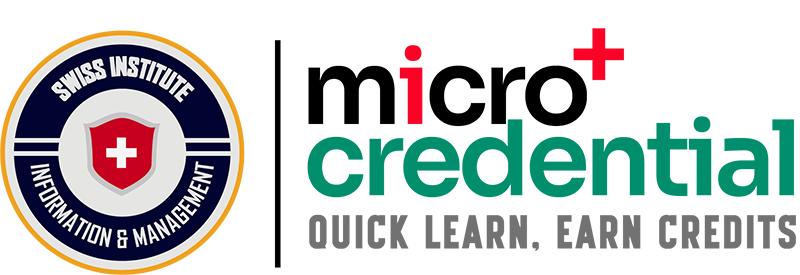Level 3 Award
in Working in Teams
Level 3 Award could transfer 20 credits and full tuition fees to Level 3 Diploma programs of SIMI Swiss.

Level 3 Award in Working in Teams
The aim of this award is learners are introduced to the advantages of teamwork and why team members need a range of skills and strengths to complete tasks successfully. Learners will also develop an understanding of how to reflect on their own and the team’s effectiveness in completing set tasks.
Could transfer 20 credits and full tuition fee to the Level 3 Diploma in Introduction to Management of SIMI Swiss.
Learning Outcomes:
1. Understand the benefits and challenges of working in a team to complete a task.
-
1.1 Compare characteristics of teams with groups.
-
1.2 Explain the advantages of working as a team to complete a task.
-
1.3 Explain the challenges of working as a team to complete a task.
2. Understand the need for a team to work to an agreed code of conduct.
-
2.1 Identify the main factors that determine the effectiveness of a team at the workplace
-
2.2 Describe how a code of conduct can benefit team working.
-
2.3 Explain the consequences of team members not following an agreed code of conduct.
3. Know how to recognise the different strengths, skills and experiences different people bring to a team.
-
3.1 Explain how to identify own strengths, skills and experiences relevant to a task being undertaken by a team.
-
3.2 Describe how to identify strengths, skills and experiences that other members bring to a particular team.
4. Understand how to allocate roles and responsibilities within the team in relation to a given task.
-
4.1 Explain how to agree with other team members on the roles and responsibilities of each member of the team.
-
4.2 Describe how each role contributes to the team’s objectives and the completion of the team task.
5. Understand how to reflect on the performance of a team.
-
5.1 Explain how individual performance can contribute to the overall performance of the team.
-
5.2 Recommend ways to improve the work of a team for future tasks.
Topics:
Understand the benefits and challenges of working in a team to complete a task.
Course Coverage
-
Team vs groups, formal and informal groups, characteristics of teams vs groups.
-
Advantages: employee/learner strengths and weaknesses, balance of skills, motivate/encourage/support each other, skills of all members are used, responsibility is shared, a sense of belonging/value.
-
Challenges: tasks must be planned, time to plan, co-operation required. agreement of all members, leadership responsibilities, decision-making, clear communication, and addressing conflict/misunderstanding.
Understand the need for a team to work to an agreed code of conduct
Course Coverage
-
Nature of effective teams, Factors affecting team effectiveness – team members, diversity, leadership, cohesiveness, communication, coordination, team maturity etc.
-
Code of conduct: set of behaviours/attitudes abide b, resulting in effective teamwork, every member should contribute, everyone should listen to views of team members, value contributions of others, accept constructive criticism, consult with other team members, make decisions as a group, follow group decisions, carry out agreed responsibilities, discuss areas of disagreement, avoid conflict.
-
Consequences: tasks not completed, not completed correctly, not to appropriate standard, conflict in a team, confusion about tasks and responsibilities, feeling let down, reluctant or anxious about working or learning with others in future.
Know how to recognise the different strengths, skills and experiences different people bring to a team.
Course Coverage
-
Teamwork skills, strengths and experiences: practical skills, IT, good with numbers and money, interpersonal skills, friendly, enthusiastic, loyal, communication skills, confident speaker, good listener, motivational skills, good at encouraging or helping others, organisational skills, delegation.
-
Assess: use of observation, monitoring, group discussion, supervision, appraisal, and feedback.
Understand how to allocate roles and responsibilities within the team in relation to a given task.
Course Coverage
-
Agree roles and responsibilities: review of objectives of team task, timescale/deadline for completion, awareness of skills and strengths of team members, matching skills and strengths of team members to tasks.
-
How each role contributes: motivation, achievement, participation, support for the team as a whole, and sense of pride.
Understand how to reflect on the performance of a team.
Course Coverage
-
Individual performance: following the code of conduct, complete individual tasks fully and on time, carry out agreed responsibilities, help/support others, offer feedback or advice to others, and contribute to the success of the whole task.
-
Ways to improve planning, decision-making, organisation, allocation of tasks, access to support and advice, peer review, and reflection.
Indicative reading list
-
Belbin, M. (1981). Management Teams: Why they succeed or fail. London: Heinemann.
-
Tuckman, B (1965) Developmental sequence in small groups, Psychological Bulletin, 63(6), 384-99.
Entry requirements
- Applicants must be at least 16 years old.
- Completion of full secondary education is required.
English requirements
If a learner is not from a predominantly English-speaking country, proof of English language proficiency must be provided.
- Common European Framework of Reference (CEFR) level B2 or equivalent
- Or A minimum TOEFL score of 101 or IELTS 5.5; Reading and Writing must be at 5.5 or equivalent
- Or A minimum Pearson Test of English Academic (PTE Academic) score of 51 or equivalent
The SIMI Swiss reserves the highest decision-making power for admission whether to accept or not accept after a specific review of each candidate’s profile to ensure that they can comprehend and gain benefits when participating. For the fake university or diploma mills, University Partners shall not be accepted.
After graduating with Level 3 Award, students receive all certified documents from the SIMI Swiss.
Certified Documents:
- e-Certificate from the Swiss Information and Management Institute (SIMI Swiss).
- Hard copy certificate from the Swiss Information and Management Institute (SIMI Swiss) – Optional.
- Accreditation of Prior Experiential Learning for Qualifications (APEL.Q) certified from SIMI Swiss for credit and tuition fee transfer.
Because the program is accredited and recognized, students can easily use certified in the working environment and have many opportunities for career advancement. In addition, in case if you want to study for a SIMI degree or university partner degree, students can convert all credits and the full paid tuition fee.
The SIMI Swiss’ Level 3 Award means:
The SIMI Swiss Level 3 Award is a qualification at the foundational level and is equivalent to the following:
- Level 3 Certificate of the Regulated Qualification Framework (RQF) in the UK
- Level 6 Certificate of the Scottish Credit and Qualifications Framework (SCQF)
- Level 3 Certificate of the Credit and Qualifications Framework for Wales (CQFW)
- Level 3 Certificate of the European Qualifications Framework (EQF)
- Level 4 Certificate of the Australian Qualifications Framework (AQF)
- Level 3 Certificate of the ASEAN Qualifications Reference Framework (AQRF)
- Level 4 Certificate of the African Continental Qualifications Framework (ACQF)
Students can convert all credits and the full tuition fee when participating in the SIMI Swiss and/or University Partners academic programs if they want to study for an academic degree.
Credits transfer:
Learners can accumulate 20 credits from the Level 3 Award program when participating in the Level 3 Diploma program. Please see the credit transfer policy HERE
Tuition fee transfer:
When participating in the Level 3 Diploma program, students who have graduated 1 Level 3 Award will receive a discount of full tuition fee which you paid. Please see the tuition fee transfer HERE
The SIMI Swiss micro-credential program allows for the transfer of credits and tuition fees into full degree programs from SIMI Swiss and/or its university partners. SIMI Swiss reserves the right to limit admissions once the number of students exceeds the quotas.
Apply Policy:
- To participate in the SIMI Swiss micro-credential program, students need to meet the entry criteria corresponding to each level. Please see the “Entry” tab for more details.
- SIMI Swiss will not accept applicants if their entry qualifications are from diploma mill universities or schools/universities that are not accredited.
- English is not a mandatory entry requirement for Micro Credential programs, but candidates need to ensure that English is used in reading documents, listening to lectures, and doing assignments. Candidates should note that English is a mandatory requirement when switching to an academic program at SIMI Swiss and University Partners.
Apply Process:
- Choose the program that suits your requirements.
- Email your application to support@simiswiss.ch with all the required documents. You can download the application form here.
- Our admission department will contact you and guide you through further processes if the registration documents need to be supplemented.
- SIMI Swiss will issue the Letter of Acceptant (LOA). You wil proceed to the next steps according to the instructions and pay tuition fee.
- SIMI Swiss will issue a student confirmation letter, login account to the e-learning system and related documents.
- You have become an official SIMI Swiss student and enjoy your study journey.
The SIMI Swiss micro-credential program is fully online, allowing you to study anytime, anywhere. You have the option to attend live classes with SIMI Swiss. The final exam will be uploaded to the system and evaluated by the academic panel of SIMI Swiss. Students must submit assignments on time; failure to do so will result in the student being considered to have discontinued the program.
Pricing Plans
Take advantage of one of our non-profit professional certified programs with favorable terms for your personal growing carreers.
- Full online videos
- e-Books
- Self-study contents
- Online tutor videos
- Assignment guide
- e-Certificate
- Hard copy certificate
- Accreditation & Recognition certified from University Partners
- Deliver hard copy certificate and all certified documents to your home
- Transfer full credits & tuition fees to equivalent academic programs
- Get more support tuition fees and scholarships when becoming SIMI' international students
- (*) In the event that you receive a scholarship or discount, the fee you should transfer is the amount you actually paid.
SWISS MICRO CREDENTIAL
Contact us
If you interested this micro credential course, please feel free to contact with us! Please note that this program is a not for profit and learning with full online model.
